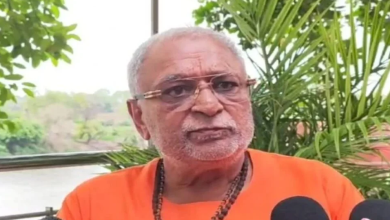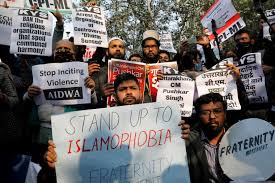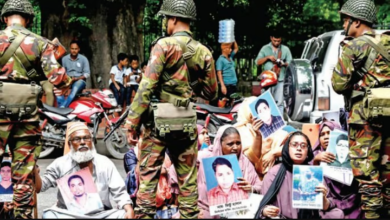Indias Ram temple symbolizes Hindu supremacy over Muslims: US media
 New York:The controversial Mondays inauguration of Ram Temple atop the ruins of Babri mosque marks the culmination of a promise made by Prime Minister Narendra Modi, his ruling Bharatiya Janata Party (BPJ) and allies, and serves as the “biggest political testament yet to Hindu supremacy over Indian Muslims,” according to TIME magazine.
New York:The controversial Mondays inauguration of Ram Temple atop the ruins of Babri mosque marks the culmination of a promise made by Prime Minister Narendra Modi, his ruling Bharatiya Janata Party (BPJ) and allies, and serves as the “biggest political testament yet to Hindu supremacy over Indian Muslims,” according to TIME magazine.
The BJP benefited from stirring up Hindu nationalism around the Babri Masjid, and in 2014 swept into power, displacing the more pluralistic Indian Congress Party, Time correspondent Audrey Truschke wrote in a dispatch from New Delhi. The BJP then began to remake secular India into a Hindu supremacist state, the dispatch said.
Following a second BJP national victory in 2019, India’s Supreme Court, whose autonomy has been undercut by the Modi government issued its final judgment that decided the fate of the Babri Masjid site, it said. The court called the mosque’s destruction “an egregious violation of the rule of law,” but nonetheless ruled that a Hindu temple could be built on the mosque’s rubble. Modi laid the foundation stone at a groundbreaking ceremony in August 2020, and will finish what the BJP and other Hindu supremacists began more than 30 years ago by consecrating the Ram temple surrounded by his Hindu nationalist peers.
Still, the event will be marked by conspicuous absences, TIME said. Leaders of the opposition Congress party will skip the festivities, in protest over what they rightly see as a consecration that is more a political ploy than a religious ceremony. Even some Hindu leaders agree, arguing that the Ram temple cannot be consecrated since it remains incomplete, and therefore violates Hindu scriptures. They also object to the participation of divisive political figures like Modi. Yet the Indian Prime Minister is pressing ahead with inaugurating an incomplete temple, even at the price of alienating Hindu religious leaders, because of India’s May 2024 general election in which the BJP hopes to secure another national victory, TIME said.
“If history is any guide, this tactic of harnessing majoritarian sentiment for political gain may well succeed”. The Ram temple’s inauguration portends dark times ahead not just for India’s Muslims but also some Hindus who remain committed to pluralism and tolerance, the dispatch said.
Hindu supremacists have long sought to reduce the broad-based Hindu religious tradition to their hateful political ideology, and the Ram temple is a “sizeable step toward that goal”. Muslims are second-class citizens in Modi’s India, regularly subjected to human rights violations, the dispatch highlighted. Freedom House now classifies India, once heralded as the world’s largest democracy, only “partly free” on account of the “rise in persecution affecting the Muslim population.” And there are signs that the Ayodhya temple may only mark a new era of the Hindu supremacist war on mosques, the dispatch said. There are numerous cases in Indian courts seeking to demolish more of them in favour of building Hindu temples in Varanasi, Mathura, and other cities.
“Such demolitions may unleash more violence on India’s beleaguered Muslim minority, and further cement the feeling that the country is for Hindus, and Hindus alone,” TIME said.
Meanwhile, CNN reported that Ayodhya’s 500,000 Muslims are in a state of “grief and anxiety” as the inauguration nears. The leading TV network quoted 65-year-old Maulana Badshah Khan as saying that he fears a repeat of the religious violence that erupted more than 30 years ago, when Hindu nationalists destroyed the 16th century mosque. Badshah Khan said he believes the event is a clear sign of how Muslims are becoming marginalized under the leadership of Modi’s BJP.
Michael Kugelman, director of the South Asia Institute at the Wilson Center, a Washington-based think-tank , wrote in Foreign Policy, a prestigious magazine, wrote, “The event also fulfills another of Modi’s signature promises, all tied in some way to Hindu nationalism. “The first such pledge he fulfilled was the 2019 revocation of Indian-administered [occupied] Kashmir’s special autonomous status, giving New Delhi more control over the Muslim-majority region. The second, in 2020, amended a citizenship law to allow refugees who fled to India from Afghanistan, Bangladesh, or Pakistan …for Indian citizenship, but excluded Muslim refugees.” Kugelman pointed out that Modi has cleverly framed Ram temple with messaging around social welfare and development, Kugelman said.








